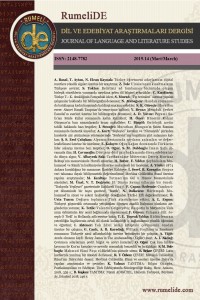Öz
Bu çalışmada, Joseph O’Neill’ in Hollanda adlı
eseri, 11 Eylül sonrası dünyadaki Oryantalist bir söylemin varlığına rağmen,
Öteki ile uzlaştırıcı bir ilişki anlatısı olarak değerlendirilmektedir. Roman,
11 Eylül'den sonra terörizm fenomeni tarafından yaratılan kaygı ve korkuyla
çevrelenen bir Batı toplumunu tasvir etmektedir. Batılı karakterler, çoğunlukla
bireysel ve toplu kaygının her yerde var olmasından dolayı kendilerini
endişeli, korkmuş ve rahatsız olarak bulmaktadırlar. Romanın en temel amacı, bu
karakterleri 11 Eylül öncesi var olan rahat alanlarından çıkartarak, bu
rahatsızlıklara sebep olan insanlarla, olaylarla ve olgularla yüzleştirerek,
ilişki kurdurmak ve uzlaştırmak için 11 Eylül sonrası oluşan rahatsızlıklar
dünyasına getirmektir. Bu teşebbüslerin
bazıları yüzleşmekten kaçan ve irrasyonel bir yaklaşımı benimserken, diğer bir takım
stratejiler ise daha anlamlı ve üretken bir şekilde keşfetmeye zorlamaktadır.
Kendi ve Öteki ile Batı'nın ve İslam'ın 11 Eylül romanlarındaki çatışmaların
varlığına benzer bir şekilde, Hollanda
bu farklılıkları kabul etmektedir. Bununla birlikte, buradaki farklı
yaklaşım, bu farklılıklardan kaçınmak, göz ardı etmek ya da kaçınmak yerine,
barış içinde birlikte yaşamanın, karşılıklı anlayışın, uzlaşmanın,
bağışlamanın, hümanizmin, hoşgörünün ve çok kültürlülük gibi ilkelere
dayanan ortak bir zemin arayışıdır. Yeni
söylem, ulusların, etnik kökenlerin, kültürlerin ve dinlerin ikili bölünmelere
sebep olduğundan, ötekini uluslar arası ve kozmopolit bir bölünmüşlük içinde
tanınmasını öngörmektedir.
Anahtar Kelimeler
Kaynakça
- Alam, Shahid. (2006) Challenging the New Orientalism: Dissenting Essays on the “War against Islam.” North Haledon, NJ: Islamic. Appiah, Kwame Anthony. (2006) Introduction. Cosmopolitanism: Ethics in a World of Strangers. New York: Norton. xi-xxi. Bradley, Arthur, and Andrew Tate.(2010) The New Atheist Novel: Fiction, Philosophy and Polemics after 9/11. New York: Continuum. Brown, Jeffrey. “Joseph O’Neill, Author of Netherland.” YouTube. YouTube, 23 Nov. 2010. Web. 16 May 2013. Butler, Judith P. (2006)Precarious Life: The Powers of Mourning and Violence. London: Verso. Derrida, Jacques. (2001) On Cosmopolitanism and Forgiveness. London: Routledge. Gilroy, Paul. (2005) Postcolonial Melancholia. New York: Columbia UP. Gray, Richard J. (2011) After the Fall: American Literature since 9/11. Chichester, West Sussex: Wiley. Head, Dominic.(2008) The State of the Novel: Britain and Beyond. Chichester, U.K.: Wiley. Hill, Jeffrey.(2010) “The American Dream of Chuck Ramkissoon: Cricket in Joseph O’Neil’s Netherland.” Journal of Sport History 37.2: 219-34. Houen, Alex. (2004) “Novel Spaces and Taking Place(s) in the Wake of September 11.” Studies in the Novel 36.3 (2004): 419-437. Huntington, Samuel P.(1996) The Clash of Civilizations and the Remaking of the World Order. New York: Touchstone, 1996. Lazarus, Neil.(1995) “Cricket and National Culture in the Writings of C.L.R. James.” Liberation Cricket: West Indies Cricket Culture. Ed. Hilary Beckles and Brian Stoddart. Manchester, England: Manchester UP. 342-355. O’Neill, Joseph.(2008) Netherland. New York: Pantheon. Said, Edward. (2003)Orientalism. New York: Vintage. Versluys, Kristiaan. (2009) Out of the Blue: September 11 and the Novel. New York: Columbia UP. Zizek, Slavoj. (2002)Welcome to the Desert of the Real! Five Essays on September 11 and Related Dates. New York: Verso.
Öz
The present paper analyzes Joseph O’Neill’s
Netherland as a narrative of conciliatory engagement with the Other despite the
presence of an Orientalist discourse in the post- September 11 world. This
novel depicts a Western society disoriented by the anxiety generated by the
intensified phenomenon of terrorism after September 11. Mostly Western
characters find themselves anxious, fearful and discomforted due to the
ubiquitous presence of individual and collective anxiety. The manifest intent
in the novel is to bring these characters out from their pre-September 11
spaces of comfort into a post-September 11 world of discomfort in order to
confront, engage and reconcile with people, events and phenomenon that have
contributed to those discomforts. These undertakings force the characters to
explore a whole plethora of strategies, some escapist and irrational, others
more meaningful and productive. Like the conflict between the self and the other,
and the West and Islam in most September 11 novels, Netherland too recognizes
those differences. However, the distinct approach here is not to avoid, ignore
or escape from those differences, but to look for a middle ground based on the
principles of peaceful co-existence, mutual understanding, conciliation,
forgiveness, humanism, tolerance and multiculturalism. The other is accorded
recognition in an international and cosmopolitan space of less divisiveness as
the new discourse discourages the binary divisions of nations, ethnicities,
cultures and religions.
Anahtar Kelimeler
Kaynakça
- Alam, Shahid. (2006) Challenging the New Orientalism: Dissenting Essays on the “War against Islam.” North Haledon, NJ: Islamic. Appiah, Kwame Anthony. (2006) Introduction. Cosmopolitanism: Ethics in a World of Strangers. New York: Norton. xi-xxi. Bradley, Arthur, and Andrew Tate.(2010) The New Atheist Novel: Fiction, Philosophy and Polemics after 9/11. New York: Continuum. Brown, Jeffrey. “Joseph O’Neill, Author of Netherland.” YouTube. YouTube, 23 Nov. 2010. Web. 16 May 2013. Butler, Judith P. (2006)Precarious Life: The Powers of Mourning and Violence. London: Verso. Derrida, Jacques. (2001) On Cosmopolitanism and Forgiveness. London: Routledge. Gilroy, Paul. (2005) Postcolonial Melancholia. New York: Columbia UP. Gray, Richard J. (2011) After the Fall: American Literature since 9/11. Chichester, West Sussex: Wiley. Head, Dominic.(2008) The State of the Novel: Britain and Beyond. Chichester, U.K.: Wiley. Hill, Jeffrey.(2010) “The American Dream of Chuck Ramkissoon: Cricket in Joseph O’Neil’s Netherland.” Journal of Sport History 37.2: 219-34. Houen, Alex. (2004) “Novel Spaces and Taking Place(s) in the Wake of September 11.” Studies in the Novel 36.3 (2004): 419-437. Huntington, Samuel P.(1996) The Clash of Civilizations and the Remaking of the World Order. New York: Touchstone, 1996. Lazarus, Neil.(1995) “Cricket and National Culture in the Writings of C.L.R. James.” Liberation Cricket: West Indies Cricket Culture. Ed. Hilary Beckles and Brian Stoddart. Manchester, England: Manchester UP. 342-355. O’Neill, Joseph.(2008) Netherland. New York: Pantheon. Said, Edward. (2003)Orientalism. New York: Vintage. Versluys, Kristiaan. (2009) Out of the Blue: September 11 and the Novel. New York: Columbia UP. Zizek, Slavoj. (2002)Welcome to the Desert of the Real! Five Essays on September 11 and Related Dates. New York: Verso.
Ayrıntılar
| Birincil Dil | İngilizce |
|---|---|
| Konular | Sanat ve Edebiyat |
| Bölüm | Türk dili ve edebiyatı |
| Yazarlar | |
| Yayımlanma Tarihi | 21 Mart 2019 |
| Yayımlandığı Sayı | Yıl 2019 Sayı: 14 |


